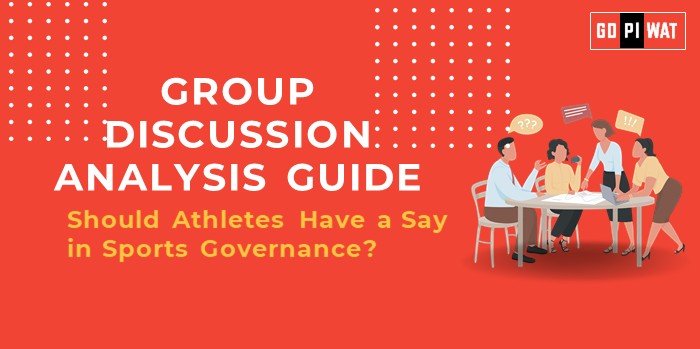📋 Group Discussion Analysis Guide: Should Athletes Have a Say in Sports Governance?
🌐 Introduction to the Topic
- 💡 Opening Context: “The world of sports thrives on the performance of athletes, but the governance shaping the sports ecosystem often excludes their voices. This debate explores whether athletes, as key stakeholders, should have a more prominent role in decision-making processes.”
- 📜 Topic Background: Historically, sports governance has been dominated by administrators, leaving athletes to focus on performance. Recent controversies surrounding governance and athlete welfare have reignited discussions about participatory governance models.
📊 Quick Facts and Key Statistics
• 🌍 IOC Athletes’ Commission: The International Olympic Committee mandates athlete representation, setting a global benchmark.
• ⚽ Recent Developments: FIFA introduced reforms for athlete engagement; however, less than 15% of national sports bodies globally include athlete representatives.
• 🇮🇳 India’s Governance: Only 10 out of 50 sports federations have athlete representation (Ministry of Sports, 2023).
• ⚽ Recent Developments: FIFA introduced reforms for athlete engagement; however, less than 15% of national sports bodies globally include athlete representatives.
• 🇮🇳 India’s Governance: Only 10 out of 50 sports federations have athlete representation (Ministry of Sports, 2023).
🤝 Stakeholders and Their Roles
- 🏋️ Athletes: Advocates for performance-focused and ethical decisions that prioritize welfare and fairness.
- 🏢 Sports Governing Bodies: Responsible for creating and implementing policies and allocating funding.
- 🏛️ Governments: Regulate sports governance frameworks and oversee funding.
- 👨👩👧👦 Fans and Sponsors: Indirectly influence governance through demand and financial support, pushing for transparency.
🏆 Achievements and Challenges
✨ Achievements:
- ✔️ Fairness in Doping Regulations: Athlete advisory councils contributed to more equitable anti-doping policies.
- 📜 Olympic Charter Revisions: Increased focus on athlete welfare and representation.
- 🌟 Examples: U.S. and Norway have seen successes in athlete-driven policy reforms.
⚠️ Challenges:
- ❌ Resistance from Administrators: Traditional governance systems often view athlete involvement as disruptive.
- 📚 Lack of Training: Many athletes lack governance skills or organizational knowledge.
- 🌏 Comparative Lag: Countries like Australia lead with over 30% athlete participation in sports boards.
📚 Case Study:
- ⚖️ U.S. SafeSport Program: Athlete-driven reforms significantly improved abuse reporting systems, setting a precedent for participatory governance.
🔍 Structured Arguments for Discussion
- ✅ Supporting Stance: “Athletes’ firsthand experience makes them indispensable for shaping fair and effective sports policies.”
- ❌ Opposing Stance: “Governance requires specialized administrative skills, which athletes may lack.”
- ⚖️ Balanced Perspective: “Athlete involvement can enhance governance, provided they are trained and supported to make informed decisions.”
💡 Effective Discussion Approaches
🔑 Opening Approaches:
- 🌟 Successful Examples: “The IOC’s athlete initiatives demonstrate the potential of inclusive governance.”
- ❌ Failures of Exclusion: “Governance failures, such as abuse scandals, highlight the cost of excluding athlete voices.”
🤝 Counter-Argument Handling:
- ✔️ “Australia’s successful integration of athletes shows that proper training and inclusion can address resistance.”
- 📋 “Programs for athlete governance training bridge skill gaps, ensuring effective participation.”
📈 Strategic Analysis of Strengths and Weaknesses
- ✔️ Strengths: Unique insights, ethical focus, and direct stakeholder input improve governance quality.
- ❌ Weaknesses: Governance inexperience and potential biases toward athlete-centric policies.
- 🚀 Opportunities: Promoting fairness and increasing public trust in sports institutions.
- ⚠️ Threats: Conflicts of interest and potential politicization of governance decisions.
🏫 Connecting with B-School Applications
- 📚 Real-World Applications:
- Aligns with business ethics and stakeholder management themes.
- Models for participatory governance in organizations.
- 🎓 Sample Interview Questions:
- 🤔 “How can athlete inclusion improve sports governance?”
- 📊 “What are the risks of athlete-driven governance policies?”
- 📘 Insights for B-School Students:
- Explore governance as a stakeholder-inclusive model, balancing ethical and organizational goals.
- Analyze parallels between sports governance and corporate board participation models.
📄 Source: Compiled Analysis, 2024


